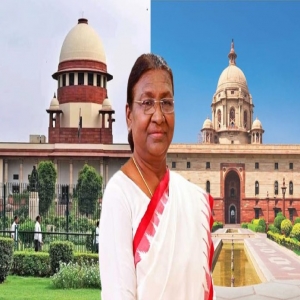
.png) Joseph Maliakan
Joseph Maliakan
.jpg)
Just a month after the Supreme Court, on a petition by the Tamil Nadu Government, set a deadline for the President and the State Governors to give assent to bills passed by the legislature, in an unprecedented and perhaps unconstitutional move, President Droupadi Murmu has written to the Supreme Court questioning whether timelines could be imposed on the President and Governors by the Constitutional Courts.
In April, a Bench of Justice JB Pardiwala and Justice R Mahadevan, using the Supreme Court's Special Powers to resolve the face-off between the DMK government in Tamil Nadu and Governor RN Ravi, ruled that the governor's refusal to approve 10 bills passed by the State Legislature was "illegal and arbitrary."
Significantly, the Supreme Court, in its order, set a three-month deadline for the President and governors to clear bills passed by the legislature a second time. The judgment also said the President must consult the courts on constitutional matters. The bench, however, clarified that if the matter pertains to policies, the Supreme Court can refuse to express its advisory opinion.
"However, in certain exceptional circumstances the governor may reserve a Bill for consideration of the President on grounds that the bill is perilous to the principles of democracy and an interpretation of the Constitution is necessary to ascertain whether such legislation should be granted assent or not. In such cases where a bill has been reserved majorly on the ground of not being in consonance with constitutional prnciples and involves questions of constitutional validity, the Executive is supposed to excercise restraint," the order said.
"It is expected that the Union Executive should not assume the role of the courts in determining the vires of the bill, and should, as a matter of practice, refer such questions to the Supreme Court under Article 143. We have no qualms in stating that the hands of the Executive are tied when engaging with purely legal issues in a bill and only the constitutional courts have the prerogative to study and provide recommendations as regards the constitutionality of a bill," the order said.
The order clarified that the Court is aware of the "non-binding nature" of its advisory jurisdiction. "However, merely because the jurisdiction under Article 143 is not binding does not undermine the principles used by this Court to determine the constitutionality of the bill," the judgement said.
The order clarified that the only reason for which the legislature or the executive wing may not take note of the Supreme Court's opinion "is when the grounds on which a State bill was reserved for the consideration of the President, are not purely legal but also involve certain policy considerations which may outweigh the issue of constitutionality."
"In such cases, if the President acts contrary to the advice of this Court and withholds assent to a bill, she must record cogent reasons and materials that justify not granting assent," the order stressed.
Under Article 143 (Power of the President to consult the Supreme Court), if at any time it appears to the President that a question of law or fact has arisen, or is likely to arise, which is of such a nature and of such public importance that it is expedient to obtain the opinion of the Supreme Court upon it, she may refer the question to the Court for consideration and the Court may, after such hearing as it thinks fit, report to the President it's opinion thereon.
So far, there have been 14 Presidential references under Article 143. The present reference differs from the previous references in that it reads like a review petition against the Supreme Court judgment of April 8, 2025, in the case filed by the Tamil Nadu Government against Governor RN Ravi for withholding assent to 10 bills passed by the Tamil Nadu legislature.
President Murmu, in her letter, asked whether timelines could be imposed on Governors. The question is irrelevant because the Supreme Court, in its order on April 8, fixed a time limit of three months for giving assent to bills not only to governors but also to the President!
The President further asks, "Is the Governor bound by the aid and advice tendered by the Council of Ministers while exercising all the options available with her when a bill is presented under Article 200 of the Constitution of India?"
Any undergraduate law student will tell you that under the Constitution, governors are bound by the advice of the Council of Ministers in all matters of governance. It is a different matter that lately, some governors have been behaving as though they are representatives of the British Raj.
The President also asked if the governor's exercise of constitutional discretion is justiciable. There have been innumerable cases, both in the High Courts and the Supreme Court, in which governors' decisions have been found to be unconstitutional. Only two years ago, the Kerala High Court set aside the governor's decision to sack the Vice-Chancellors of some State Universities.
Referring to the President's letter, Tamil Nadu Chief Minister MK Stalin said that this is the Union Government's attempt to "subvert constitutional position already settled by the Supreme Court in the Tamil Nadu case." This attempt clearly exposes that the Tamil Nadu Governor acted at the BJP's behest to undermine the people's mandate. This is a desperate attempt to weaken democratically elected State Governments by placing them under the control of Governors serving as agents of the Union Government.
It also directly challenges the majesty of law and the authority of the Supreme Court as the final interpreter of the Constitution," Stalin added.